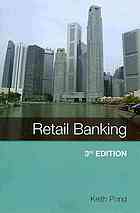

Most ebook files are in PDF format, so you can easily read them using various software such as Foxit Reader or directly on the Google Chrome browser.
Some ebook files are released by publishers in other formats such as .awz, .mobi, .epub, .fb2, etc. You may need to install specific software to read these formats on mobile/PC, such as Calibre.
Please read the tutorial at this link: https://ebookbell.com/faq
We offer FREE conversion to the popular formats you request; however, this may take some time. Therefore, right after payment, please email us, and we will try to provide the service as quickly as possible.
For some exceptional file formats or broken links (if any), please refrain from opening any disputes. Instead, email us first, and we will try to assist within a maximum of 6 hours.
EbookBell Team

4.8
94 reviewsRetail banks have undergone considerable
changes in the last thirty years – and their capacity to react to economic,
environmental, political, social and technological pressures will guarantee
further changes in the decades to come. This edition updates earlier versions
of the book in its treatment of issues surrounding the industry. It also
emphasizes the priorities of retail banks today, and their regulatory and
practical environment.
The text itself is divided broadly into two
parts, Chapters 1–6 covering banking concepts and the current banking
environment, and Chapter 7–12, key retail banking operations.
In the first half of the book, we consider
what banking actually is and what banks do. We discuss some key economic
concepts that underpin much banking activity in both historical and modern-day
contexts and we examine banking risks, along with some of the ways in which
banks overcome or minimize the adverse impact of such risks. We go on to review
the position of banks within the economy, and their regulation by national and
international bodies, and look at a bank’s profitability from the perspective
of its annual accounts.
In the second half of the book, we cover the
key banking transactions – from the different types of bank account and product
offered, to the use of payment systems (a necessary adjunct to intermediation).
The book goes on to introduce the topic of lending, whereby some key credit
risk tools are reviewed and applied, and basic securities are considered as a
vital ‘secondary repayment method’ in the event of credit default. The book
ends with an overview of the recovery of money by means of court action and
insolvency procedures.
Throughout the book, you should consider the
content in relation to particular examples of practice in your own national and
regulatory environment. Often the differences in law, history and geography
result in different banking responses to familiar questions and challenges.
This book cannot promise to be an exhaustive review of all such practice, but it
employs specific examples to highlight generic principles and common responses
to them.